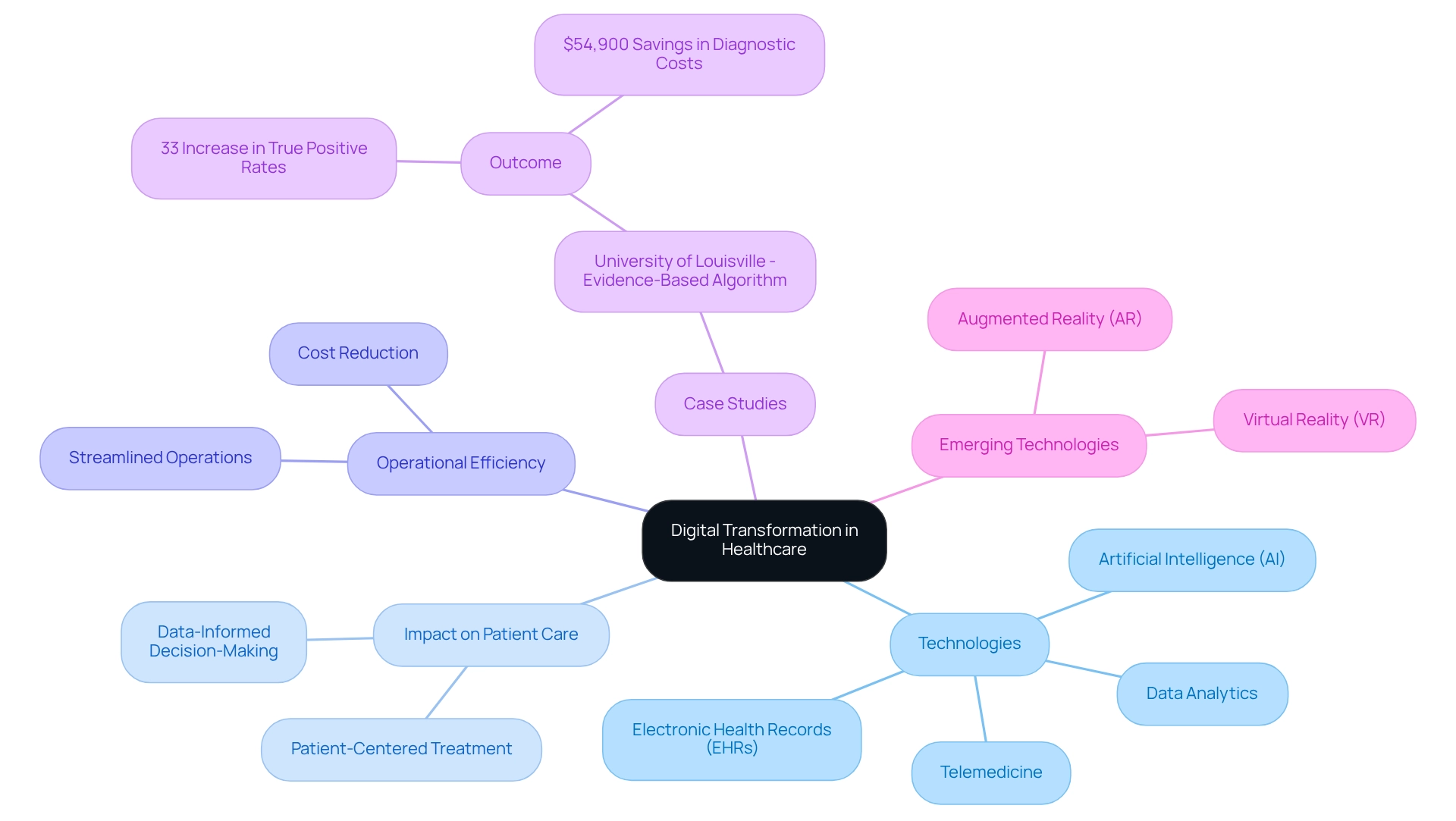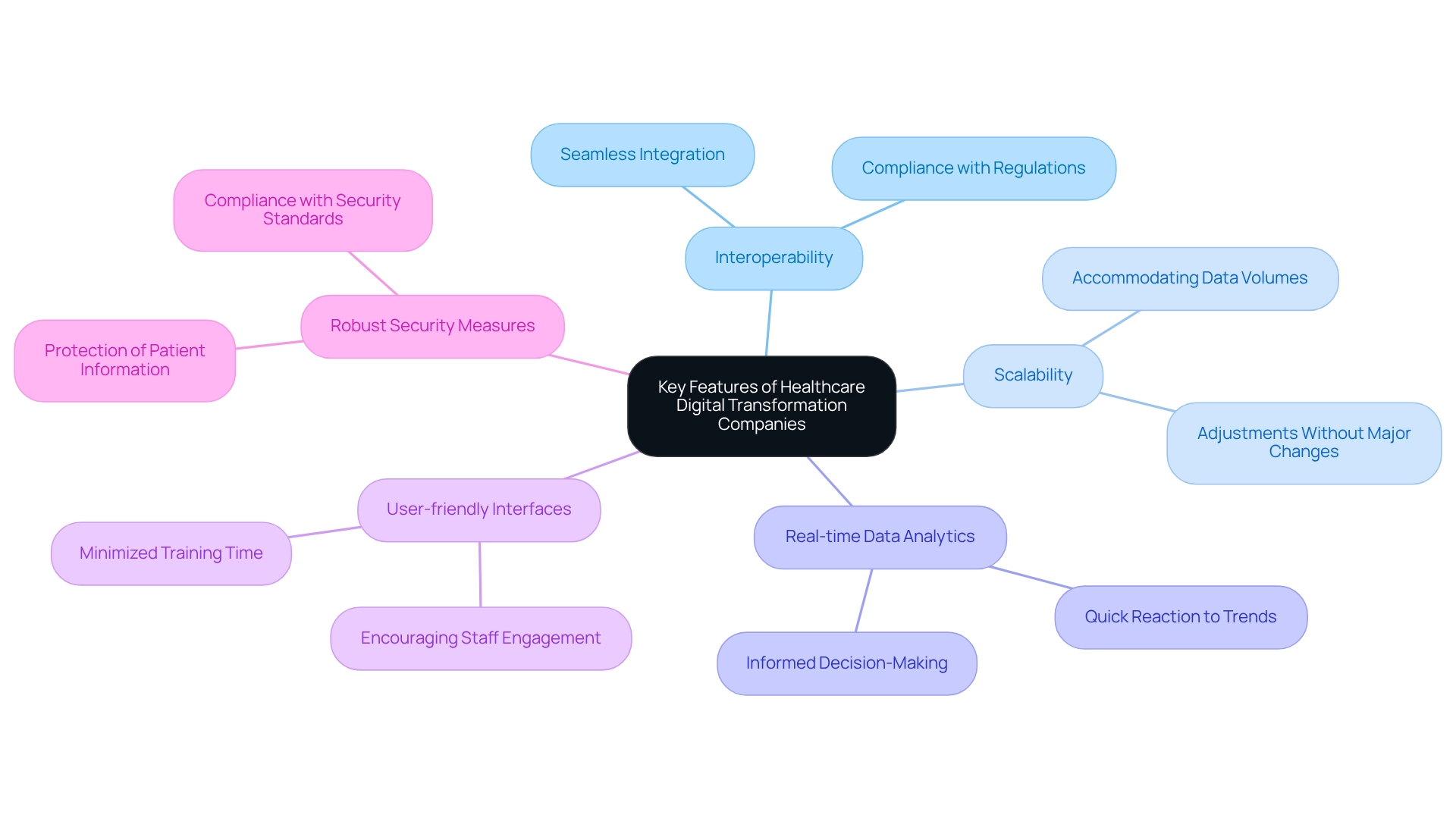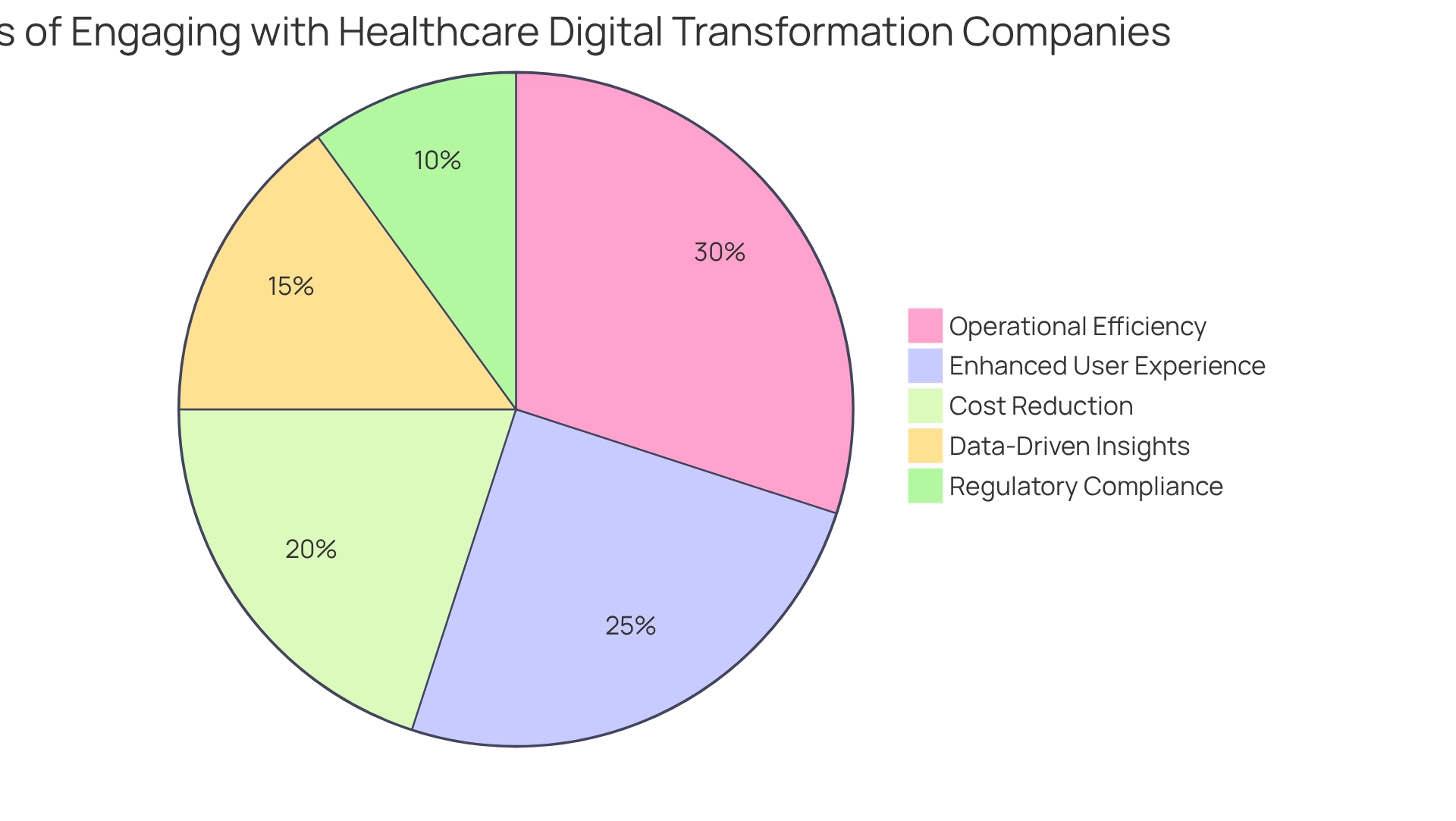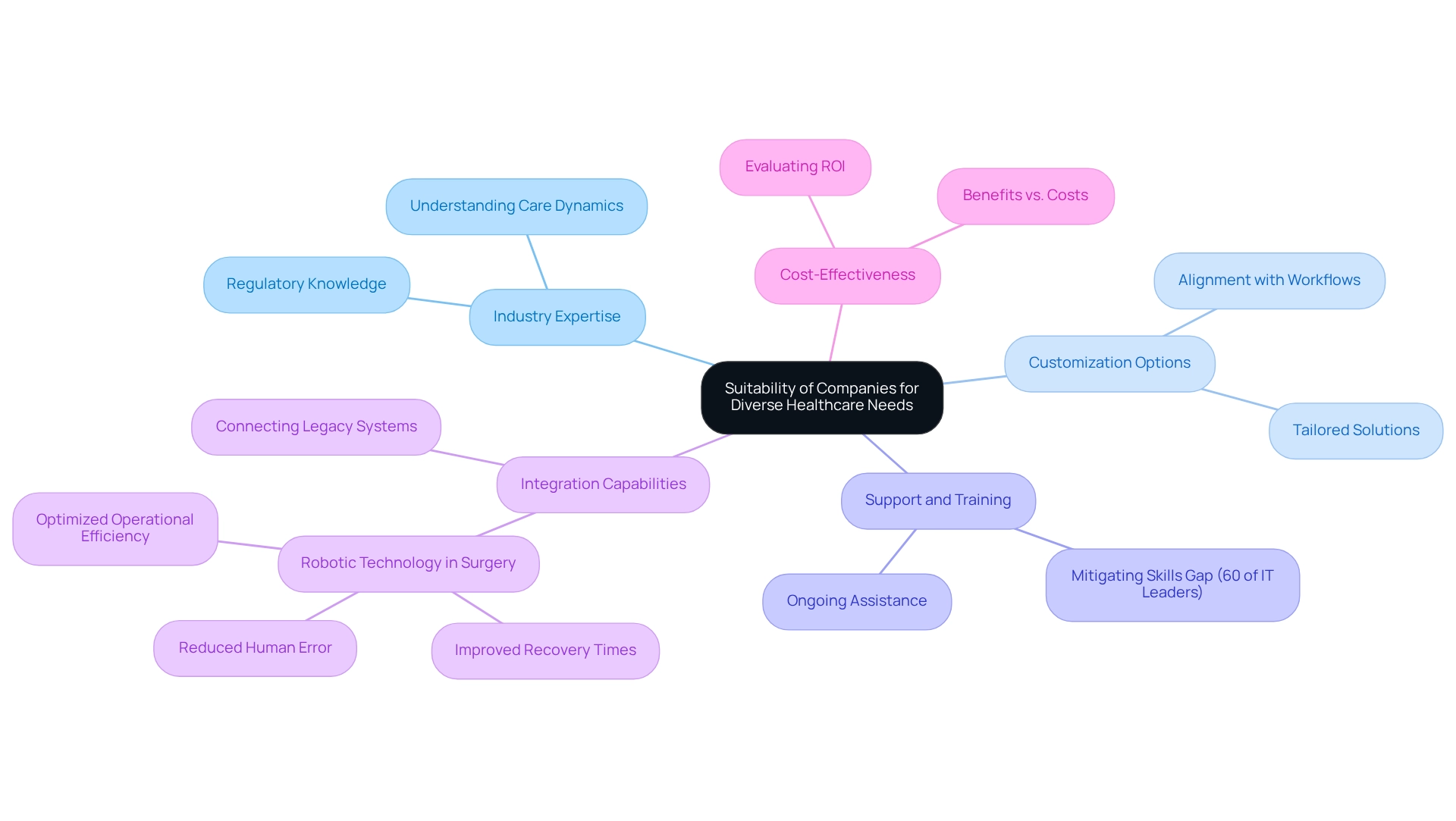Overview
We recognize that healthcare digital transformation companies play a crucial role in enhancing patient care, operational efficiency, and cost reduction through advanced technologies such as EHRs, AI, and data analytics.
What challenges are you facing in modernizing your healthcare services?
Our insights reveal successful implementations and key features like interoperability, scalability, and real-time data analytics.
These elements are pivotal in meeting the evolving needs of patients and organizations alike.
As a result, we are committed to supporting your journey in leveraging these technologies to transform healthcare services effectively.
Introduction
In the rapidly evolving landscape of healthcare, we recognize that digital transformation is a pivotal force reshaping how services are delivered and experienced. By integrating cutting-edge technologies such as electronic health records, telemedicine, and artificial intelligence, we are not only enhancing patient care but also improving operational efficiencies and reducing costs.
As the industry moves towards a more patient-centered approach, the urgency for adopting these digital solutions has never been greater. What’s holding your organization back from embracing this change?
This article explores the profound implications of digital transformation in healthcare, highlighting:
- Successful case studies
- Key features of leading technology providers
- The myriad benefits that we can reap by embracing this evolution
As the future unfolds, understanding these dynamics will be essential for healthcare leaders like us, aiming to navigate the complexities of modern care delivery.
Understanding Digital Transformation in Healthcare
Healthcare digital transformation companies are leading a pivotal shift in medical services through technological transformation, integrating electronic technologies across all operational facets and fundamentally reshaping service delivery and patient-provider interactions. This evolution involves various technologies, such as electronic health records (EHRs), telemedicine, artificial intelligence (AI), and data analytics, all supported by healthcare digital transformation companies, aimed at enhancing patient care, improving operational efficiency, and reducing costs. As we approach 2025, the emphasis on patient-centered treatment and data-informed decision-making has never been more vital, making the role of healthcare digital transformation companies essential for contemporary medical services.
Successful instances of technological transformation in the medical field illustrate its profound impact. For instance, the University of Louisville developed an evidence-based algorithm to standardize ordering practices in autoimmune neurology care, resulting in a 33% increase in true positive rates for relevant antibodies and saving approximately $54,900 in diagnostic expenses. This case underscores how healthcare digital transformation companies can use digital technologies to streamline operations and enhance outcomes, highlighting the importance of operational efficiency and cost savings in healthcare.
Recent trends reveal a growing focus on immersive technologies, such as augmented reality (AR) and virtual reality (VR), which we encourage management teams to incorporate into training and client engagement strategies. The Interface Summit showcased how VR can be utilized for pain management, demonstrating that simply equipping a child with a VR headset can significantly diminish their perception of pain during procedures. Moreover, AI-driven avatars can assist individuals in understanding their treatment options more comprehensively than traditional consultations allow. For banking IT managers, grasping how these technologies can enhance operational processes is crucial. Employee training in virtual simulations and navigating complex systems is increasingly essential as medical institutions adapt to these advancements.
Data from sector reports indicate that healthcare digital transformation companies can significantly reduce medical expenses while enhancing care for individuals. As Greg Wiederrecht, Ph.D., aptly noted, “Healthcare technology will, one day very soon, literally touch us all on a daily basis.” This sentiment emphasizes the necessity for entities to embrace these changes to remain competitive and responsive to evolving client needs.
In summary, the impact of electronic technologies on medical operations is significant, as healthcare digital transformation companies contribute to a clear trajectory toward enhanced efficiency and improved patient experiences. As the landscape continues to evolve, we must prioritize technological transformation through healthcare digital transformation companies to fully harness the potential of these advancements.

Key Features of Leading Healthcare Digital Transformation Companies
Leading healthcare digital transformation companies recognize that this is not just a trend; it is a necessity for modern medical entities. We recognize that several key features are essential for effective integration and modernization:
- Interoperability: Seamless integration with existing systems and data sources is vital for successful digital transformation. This capability ensures that medical entities can share and utilize data across various platforms, enhancing overall efficiency. Our hybrid integration platform exemplifies this, simplifying the connection of disparate systems while ensuring compliance with stringent regulations.
- Scalability: Our solutions are designed to expand in tandem with your organization, accommodating increasing data volumes and user demands. As medical systems develop, scalable solutions allow for adjustments without major changes, ensuring that your growth is supported.
- Real-time Data Analytics: Access to real-time information is essential for informed decision-making and improved outcomes. By utilizing analytics, medical providers can react quickly to emerging trends and individual needs, ultimately enhancing the quality of care.
- User-friendly Interfaces: We understand that intuitive designs are crucial for promoting user adoption among medical professionals. A user-friendly interface minimizes training time and encourages staff to engage effectively with the technology.
- Robust Security Measures: Given the sensitivity of medical data, we prioritize strong security protocols to protect patient information. Comprehensive security strategies are imperative to safeguard against breaches and ensure compliance with regulatory standards. Our platform is designed for secure transactions, trusted by banks, medical services, and government sectors, ensuring 24/7 uptime with no room for defects, errors, or outages. In 2022, 75% of medical organizations expressed confidence in their cybersecurity measures, reporting that they felt adequately prepared to handle potential threats.
Gustavo Estrada from BC Provincial Health Services Authority noted, “We have the ability to simplify complex projects and deliver results within desired time frames and budget constraints,” highlighting our platform’s interoperability and user-friendly interfaces.
The expanding market for medical interoperability solutions underscores the rising demand for these capabilities, which is being addressed by healthcare digital transformation companies in response to escalating medical costs and the need for efficient data management. As North America dominates the interoperability solutions market, the Asia-Pacific region is emerging as the fastest-growing area, indicating a shift towards electronic health solutions in developing markets. This trend emphasizes the critical role of interoperability in medical technology, as organizations seek scalable solutions that can adapt to evolving demands and enhance operational capabilities. Expert insights highlight that successful technological transformation in the medical sector relies on key features provided by healthcare digital transformation companies, placing us at the forefront of this crucial industry evolution.

Benefits of Engaging with Healthcare Digital Transformation Providers
Engaging with healthcare digital transformation companies offers a multitude of advantages that can significantly enhance our organizational performance.
-
Enhanced User Experience: Digital tools enable personalized care, resulting in increased satisfaction and engagement. By 2025, statistics suggest that medical organizations utilizing technological solutions will observe significant enhancements in experience metrics, with many reporting increased satisfaction scores. Notably, 74% of health executives indicated they would invest in predictive modeling in 2021, underscoring the importance of healthcare digital transformation companies in improving user experience.
-
Operational Efficiency: The automation of routine tasks alleviates administrative burdens, allowing healthcare professionals to dedicate more time to patient care. Our hybrid integration platform simplifies intricate integrations, accelerating the connection of isolated systems and fragmented data, enabling us to achieve operational efficiency improvements. Case studies demonstrate that organizations implementing automation have redirected hundreds of hours each year to strategic initiatives, significantly enhancing their operational capabilities.
-
Cost Reduction: Streamlined processes and better resource management contribute to substantial cost savings. By optimizing workflows, healthcare digital transformation companies can effectively reduce overhead costs while maintaining high-quality care. Our platform supports this by simplifying complex integrations, leading to more cost-effective solutions.
-
Data-Driven Insights: Access to comprehensive data analytics empowers us to make informed decisions, ultimately enhancing clinical outcomes. The integration of AI and machine learning into our business processes has proven to unlock new growth opportunities while optimizing resources for strategic priorities. For instance, the case study titled “AI and Automation in Business” illustrates how these technologies enhance efficiency and drive innovation.
-
Regulatory Compliance: Numerous providers include integrated compliance functionalities that assist medical entities in adhering to industry regulations, thus mitigating legal risks. This is especially vital in fields such as medicine, where regulatory scrutiny is intense.
As one of our customers, Gustavo Estrada, stated, “Avato has the ability to simplify complex projects and deliver results within desired time frames and budget constraints.” By leveraging these advantages, we can not only improve our operational capabilities but also ensure we are adequately prepared to address the evolving requirements of the sector.

Suitability of Companies for Diverse Healthcare Needs
When we evaluate healthcare digital transformation companies for diverse medical requirements, we must prioritize several key criteria:
-
Industry Expertise: We recognize that these companies with a strong track record in healthcare possess the necessary insights to navigate sector-specific challenges effectively. Their knowledge of regulatory requirements and care dynamics is invaluable. Our leaders and teams must have a profound understanding of client needs to enhance the client experience.
-
Customization Options: Tailoring solutions to meet unique organizational requirements is essential for successful implementation. Customization ensures that technologies align with specific workflows and patient needs, thereby enhancing overall effectiveness. Digital tools can automate repetitive tasks, leading to faster processing and decreasing the administrative burden on medical providers.
-
Support and Training: Ongoing assistance and instruction are vital for enabling medical personnel to use new technologies effectively. This ongoing education helps mitigate the skills gap, which, according to recent findings, affects 60% of IT leaders in the industry. By investing in training, we can ensure our staff is equipped to handle new systems and processes.
-
Integration Capabilities: Robust integration solutions are crucial for connecting legacy systems with modern technologies. Companies like Avato excel in this area, offering a dedicated hybrid integration platform that simplifies the integration of disparate systems. This capability promotes smoother transitions, allowing medical entities to utilize existing investments while embracing innovative solutions. For instance, the integration of robotic technology in surgery has improved recovery times, reduced human error, and optimized operational efficiency. Avato’s commitment to building technological foundations guarantees that enterprises can efficiently engage stakeholders and shape their business processes for successful transformation.
-
Cost-Effectiveness: Evaluating the return on investment (ROI) is critical. Organizations must ensure that the benefits of engaging with a provider, such as improved operational efficiency and enhanced patient outcomes, outweigh the associated costs. Incorporating these criteria will empower healthcare organizations to make informed decisions when selecting healthcare digital transformation companies as partners, ultimately leading to more effective and sustainable technology implementations. By understanding these insights, we can also apply similar strategies to enhance our integration efforts and future-proof our operations.

Conclusion
Digital transformation is not merely a trend in healthcare; it is a necessity that reshapes the fabric of service delivery and patient interactions. We recognize that through a comprehensive integration of advanced technologies—such as electronic health records, telemedicine, and artificial intelligence—healthcare organizations can enhance patient care, streamline operations, and achieve significant cost savings. Successful case studies, like those from the University of Louisville, demonstrate the tangible benefits that can arise from embracing these digital innovations, including improved diagnostic accuracy and reduced costs.
The key features of leading digital transformation providers, including interoperability, scalability, and robust security measures, are essential for organizations aiming to modernize effectively. These attributes not only facilitate seamless integration and user adoption but also safeguard sensitive patient information, which is paramount in today’s digital landscape. As the demand for healthcare interoperability solutions grows, we must prioritize these features to remain competitive and responsive to evolving patient needs.
Engaging with digital transformation providers offers a multitude of advantages, from enhanced patient experiences to operational efficiencies and cost reductions. The ability to leverage data analytics and automate routine tasks empowers healthcare professionals to focus on what truly matters—patient care. Moreover, customization and ongoing support ensure that solutions are tailored to meet the unique challenges faced by each organization.
In conclusion, we assert that the journey towards digital transformation in healthcare is crucial for enhancing service delivery and improving patient outcomes. By embracing these changes, we can position ourselves at the forefront of healthcare innovation, ultimately creating a more efficient and patient-centered care model. The time to act is now; the future of healthcare depends on it.

